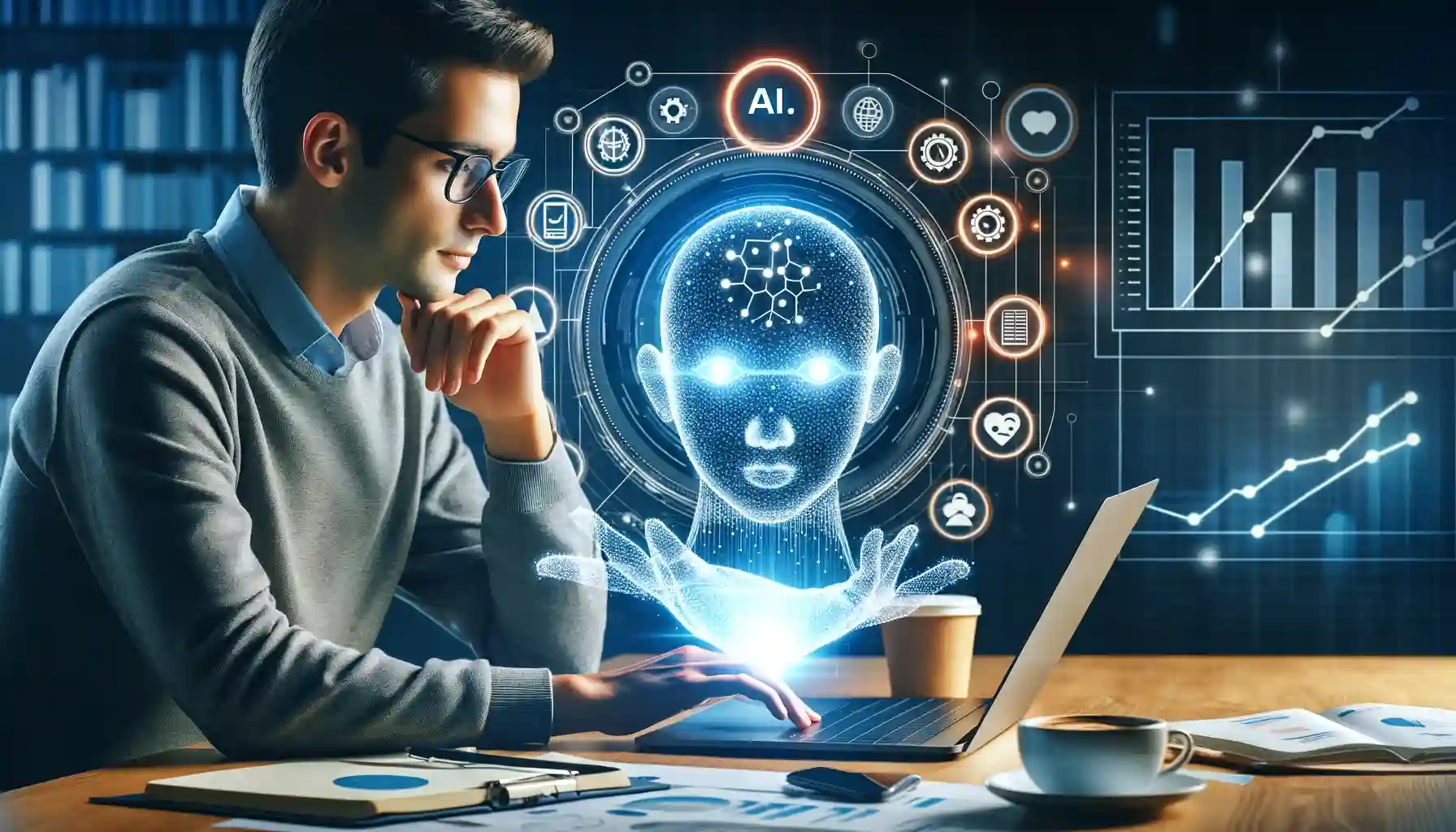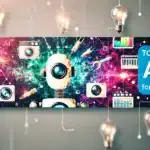The digital marketing landscape is a whirlwind of activity. From content creation and social media management to email marketing and campaign analysis, marketers wear many hats. But what happens when the workload becomes overwhelming, hindering productivity and hindering your ability to achieve marketing goals?
This is where AI marketing steps in as a transformative force. By leveraging Artificial Intelligence (AI), marketers can automate repetitive tasks, streamline workflows, and gain valuable insights that fuel data-driven decision-making. The result? A significant boost in marketing productivity and efficiency, allowing you to focus on strategic initiatives and achieve greater results.
The AI Productivity Revolution: How AI Streamlines Marketing Workflows
AI marketing tools offer a multitude of features designed to streamline marketing workflows and free up your time for strategic thinking. Here’s a glimpse into how AI can revolutionize your marketing productivity:
- Marketing Automation: AI automates repetitive tasks such as email marketing campaigns, social media scheduling, and ad campaign management. Imagine scheduling social media posts for the entire month in one go, or automatically sending personalized email sequences to nurture leads. This frees up valuable time you can dedicate to developing high-impact marketing strategies.
- Content Creation Assistance: AI can assist with content ideation, generation, and optimization. AI tools can analyze audience data to suggest relevant topics, generate content drafts, and even optimize content for search engines. This allows you to create high-quality, engaging content at a faster pace.
- Data Analysis and Insights: AI excels at analyzing vast amounts of marketing data. AI tools can identify trends, track campaign performance, and generate actionable insights to optimize your marketing efforts for maximum impact. Imagine having real-time data on your social media campaign performance, allowing you to adjust your strategy on the fly.
Expanding on Marketing Automation:
Marketing automation is a cornerstone of AI-powered productivity. By automating repetitive tasks, AI frees up valuable time for marketers to focus on more strategic initiatives. Here’s a deeper dive into how AI transforms marketing automation:
- Personalized Email Marketing at Scale: Craft personalized email campaigns with ease. AI can personalize email subject lines, greetings, and content based on customer demographics, purchase history, and online behavior. This targeted approach increases engagement and conversion rates.
- AI-powered Social Media Management: Schedule social media posts across multiple platforms in advance, and leverage AI to identify optimal posting times for maximum reach. AI can also analyze social media conversations and suggest relevant content to engage your audience.
- Lead Generation and Nurturing: AI can automate lead generation processes by qualifying leads based on predefined criteria. Additionally, AI can personalize lead nurturing campaigns by sending targeted emails and content based on a lead’s position in the sales funnel.
By automating these tasks and more, AI marketing tools empower marketers to streamline their workflows, manage their time effectively, and dedicate more resources to developing strategic marketing campaigns.
AI-Powered Insights: Unlocking the Secrets to Marketing Success
Data is the lifeblood of successful marketing campaigns. However, analyzing vast amounts of marketing data can be a time-consuming and complex task. AI marketing tools come to the rescue by providing data analysis and insights that empower marketers to make informed decisions and optimize their campaigns for maximum impact. Here’s how AI transforms marketing through data:
- Real-Time Performance Tracking: AI can track campaign performance in real-time, providing valuable insights into metrics like website traffic, engagement rates, and conversion rates. This allows you to identify areas that are performing well and areas that need improvement, enabling you to make data-driven adjustments on the fly.
- Predictive Analytics: AI leverages machine learning algorithms to predict future customer behavior and trends. This allows you to anticipate customer needs and proactively tailor your marketing messages to resonate with your audience. Imagine predicting which customers are at risk of churn and implementing targeted retention campaigns to win them back.
- Customer Segmentation and Targeting: AI can analyze customer data to segment your audience into distinct groups based on demographics, interests, and online behavior. This allows you to deliver highly targeted marketing messages that resonate with each segment’s specific needs and preferences. By personalizing your marketing efforts, you can significantly improve campaign effectiveness and ROI.
Expanding on Predictive Analytics:
Predictive analytics is a powerful AI feature that empowers marketers to anticipate customer behavior and make data-driven decisions. Here’s a closer look at how AI unlocks the power of prediction in marketing:
- Personalized Product Recommendations: AI can analyze a customer’s past purchases and browsing behavior to recommend products or services that are likely to interest them. This personalized approach increases the chances of a customer making a purchase and boosts overall sales.
- Churn Prediction and Retention Strategies: AI can analyze customer data to identify customers who are at risk of churning. By predicting churn, you can proactively implement targeted retention campaigns with personalized offers and incentives to win back these customers before they leave.
- Dynamic Content Optimization: AI can analyze user behavior and website traffic patterns to optimize website content in real-time. Imagine a website that dynamically personalizes product recommendations or blog content based on a user’s browsing behavior, creating a more engaging and relevant customer experience.
By leveraging predictive analytics, AI marketing tools empower marketers to anticipate customer needs, personalize marketing messages, and ultimately achieve greater marketing success.
Unveiling the Human-AI Collaboration Advantage: A Symbiotic Relationship
While AI offers a plethora of benefits for marketing productivity, it’s important to remember that AI is a tool, not a replacement for human creativity and strategic thinking. The future of marketing lies in a collaborative approach where AI and human expertise work together to achieve optimal results. Here’s how this partnership unfolds:
- Human Oversight and Strategic Direction: Humans will continue to play a crucial role in setting the overall marketing strategy, defining campaign goals, and ensuring brand alignment. AI will assist with data analysis and execution, but humans will remain in the driver’s seat, guiding the marketing ship towards success.
- Enhanced Creativity with AI Inspiration: AI can spark creative ideas and content by analyzing trends, identifying audience preferences, and suggesting unexpected content angles. However, human creativity remains irreplaceable in crafting compelling marketing messages, developing engaging narratives, and creating a unique brand voice. Imagine using AI to identify trending topics within your niche and then crafting compelling blog posts or social media content around those themes, leveraging your human expertise to develop a unique brand voice.
- Focus on Human-Centric Customer Experiences: AI can automate tasks and personalize experiences, but building meaningful connections with customers requires a human touch. Marketers will need to leverage AI to personalize interactions while also focusing on building emotional connections with their audience through storytelling, brand values, and exceptional customer service.
Essential Skills for the AI-Powered Marketer
The evolving marketing landscape demands a new skillset for success. Here are some key capabilities that will be essential for the AI-powered marketer of the future:
- Data Analysis and Interpretation: The ability to analyze marketing data, understand key metrics, and translate insights into actionable strategies will be critical. AI will generate vast amounts of data, and marketers need to be equipped to interpret it effectively.
- Strategic Thinking and Planning: Developing data-driven marketing strategies that align with business goals and utilize AI effectively will be paramount.
- Content Marketing Expertise: Creating high-quality, engaging content that resonates with the target audience and leverages AI for optimization will be essential.
- Customer Empathy and Storytelling: Understanding customer needs, motivations, and pain points will be crucial for building emotional connections and crafting compelling brand stories.
- Technology Adoption and Integration: Staying up-to-date with the latest AI marketing tools and platforms and integrating them seamlessly into marketing workflows will be key for achieving success.
Building Your AI Marketing Toolkit
Now that you understand the transformative power of AI marketing, it’s time to explore the tools that can help you achieve your marketing goals. Here’s a breakdown of some key AI marketing tools to consider:
- Marketing Automation Platforms: These platforms allow you to automate repetitive tasks like email marketing, social media scheduling, and ad campaign management. Popular options include HubSpot, Marketo, and Pardot.
- Content Marketing Tools: AI-powered content marketing tools can assist with content ideation, generation, and optimization. Examples include Jasper, Rytr, and MarketMuse.
- Social Media Management Tools: These tools help you schedule social media posts, analyze social media conversations, and identify optimal posting times. Consider tools like Hootsuite, Buffer, and Sprout Social.
- Data Analytics and Reporting Tools: AI-powered analytics platforms provide real-time insights into campaign performance, customer behavior, and market trends. Popular options include Google Analytics, Tableau, and Looker.
By incorporating these AI marketing tools into your workflow, you can streamline processes, gain valuable data insights, and ultimately achieve greater marketing success.
FAQs and the Road Ahead
Q: How can I get started with AI marketing if I have a limited budget?
A: Even with a limited budget, you can still leverage the power of AI marketing. Here are some strategies:
- Free Trials and Freemium Plans: Many AI marketing tools offer free trials or freemium plans with limited features. This allows you to experiment with AI and see how it can benefit your marketing efforts before committing to a paid plan.
- Start with One Tool: Instead of trying to implement multiple AI tools at once, start by focusing on one specific area where AI can add value. For example, you could begin with an AI-powered content marketing tool to streamline content creation.
- Open-Source AI Tools: Explore open-source AI tools available online. While they may require some technical expertise to use, they offer a cost-effective way to incorporate AI into your marketing strategy.
Q: I’m concerned about AI replacing marketing jobs. What skills should I focus on to stay relevant?
A: AI is not designed to replace marketing jobs; it’s designed to augment human capabilities. The future of marketing lies in collaboration between AI and human expertise. Here are some skills to focus on to stay relevant:
- Strategic Thinking and Planning: AI excels at automation and data analysis, but humans are still needed to develop data-driven marketing strategies and translate insights into actionable plans.
- Creativity and Storytelling: AI can assist with content creation, but human creativity remains irreplaceable in crafting compelling marketing messages and developing engaging narratives that resonate with your audience.
- Customer Empathy and Relationship Building: Building emotional connections with customers is a human strength that AI cannot replicate. Focus on developing your customer empathy and relationship-building skills to add a human touch to your AI-powered marketing initiatives.
- Data Analysis and Interpretation: The ability to analyze marketing data, understand key metrics, and translate insights into actionable strategies will be crucial in the AI-powered marketing landscape.
Key Takeaways:
- AI marketing is a powerful tool that can significantly boost marketing productivity and efficiency.
- AI automates repetitive tasks, generates data-driven insights, and empowers marketers to make data-driven decisions.
- The future of marketing lies in a collaborative approach where AI and human expertise work together.
- Marketers must develop a new skillset to thrive in the AI-powered marketing landscape, focusing on strategic thinking, creativity, customer empathy, and data analysis.
Conclusion: Embrace the AI Marketing Revolution
The digital marketing landscape is constantly evolving, and AI is at the forefront of this transformation. By embracing AI as a valuable partner and fostering a collaborative approach, you can unlock a new era of marketing success.
Take the first step towards your AI marketing journey! Explore some of the free trials or freemium plans offered by AI marketing tools. Experiment with a tool that aligns with your current marketing needs, whether it’s content creation, social media management, or email marketing automation. See how AI can streamline your workflow and free up your time to focus on strategic marketing initiatives. As you gain experience and confidence with AI marketing, you can explore more advanced tools and strategies to unlock the full potential of AI for your business.


